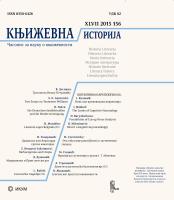Worth Pursuing? The Limits of Cognitive Narratology
Worth Pursuing? The Limits of Cognitive Narratology
Author(s): Jarmila MildorfSubject(s): Studies of Literature, Theory of Literature
Published by: Институт за књижевност и уметност
Keywords: cognitive narratology;empirical approaches to cognition and literature;literary interpretation;cognitive-functional linguistics;deixis;dialogue;spatiotemporal parameters
Summary/Abstract: Cognitive narratology remains a disparate field but has recently gainedrenewed interest in the wake of academic endeavours to launch transdisciplinaryresearch projects across the humanities/sciences divide. This paper presents a criticalview of cognitive narratology, questioning especially its explanatory power whenit comes to interpreting literary texts. While it is legitimate to ask about readers’perceptions when reading fictional texts, empirical studies rarely offer illuminatinginsights as regards the aesthetic design and meaning-making of texts. Likewise, thetheoretical models offered by cognitive narratology are often too crude to capturethe sometimes complex playfulness of literary texts, and they are mired in abstractmetaphorical discourses that are hardly helpful. In discussing one exemplary textpassage from May Sinclair’s modernist novel Mary Olivier (1919), I draw on cognitiveconcepts such as “enaction” and cognitive-functional approaches to deixis to thenpoint out some of the shortcomings of these cognitive approaches to date. Ultimately,this paper advocates questions more pertinent to literary analysis and the return totext-based interpretation
Journal: Књижевна историја
- Issue Year: 47/2015
- Issue No: 156
- Page Range: 33-48
- Page Count: 16
- Language: English

